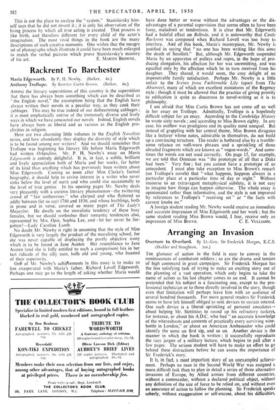Rackrent To Barchester
AMONG the literary superstitions of this country is the superstition that there has always been something which can be described as the English novel," the assumption being that the English have always written their novels in a peculiar way, as they cook their cabbages. This may be true indeed of our disheartening cabbages ; it is most emphatically untrue of the immensely diverse and lively ways in which we have concocted our novels Indeed, English novels have always been as liberal and as various as the English pro- clivities in religion.
Here are two charming little volumes in the English Novelists series, and how abundantly they display the diversity of style which is to be found among our writers! And we should remember that Trollope was beginning his literary life before Maria Edgeworth had written Orlandino. Mr. P. H. Newby's essay on Maria Edgeworth is entirely delightful. It is, in fact, a subtle, brilliant and lively appreciation both of .Maria and her works, far better of its kind than anything which has previously been written about Miss Edgeworth. Coming so soon after Miss Clarke's factual biography, it should help to revive interest in a writer who never sinks below the level of merit and who could rise occasionally to the level of true genius. In his opening pages Mr. Newby deals very pleasantly with a curious literary phenomenon—the twittering crowd of " fair authoresses " who chirped and who fluttered so oddly between (let us say) 1780 and 1830, and whose burblings, both in prose and in verse, covered so many pages of The Lady's Magazine. He dwells on the moralistic tendency of these busy females, but we should ren*mber their romantic tendencies also, represented by Mrs. Opie, Sophia Lee, and—let her never be for- gotten !—Lady Caroline Lamb.
No doubt Mr. Newby is right in assuming that the style of Miss Edgeworth is very largely the product of the moralising school, for she was never capable of displaying the purely objective irony which is to be found in Jane Austen Her resemblance to Jane Austen (and she is fully entitled to such a comparison) lies in her tart ridicule of the silly men, both old and young, who boasted of their superiority. On of Mr. Newby's achitkerrrents in this essay is to make us less exasperated with Maria's father, Richard Lovell Edgeworth. Perhaps one may go to the length of asking whether Maria would
have done better or worse without the advantages or the dis- advantages of a parental supervision that seems often to have been fussy, maladroit or tendentious. It is clear that Mr. Edgeworth had a baleful effect on Belinda, and it is noteworthy that Castle Rackrent was composed when Richard Lovell was too busy to interfere. And of this book, Maria's masterpiece, Mr. Newby is justified in saying that " no one has been writing like this since the death of Smollett." But, although Mr. Edgeworth suspended Maria by an apparatus of pulleys and ropes, in the hope of pro- ducing elongation, his affection for her was unremitting, and was equalled only by the affection which he in turn received from his daughter. They shared, it would seem, the cosy delight of an impenetrable family satisfaction. Perhaps Mr. Newby is a little unfair to the Scenes front Fashionable Life (apart. from The Absentee), many of which are excellent miniatures of the Regency style ; though it must be allowed that the practice of giving priority to edification is quite as disastrous to novel-writing as it is to philosophy.
I am afraid that Miss Curtis Brown has not come off so well in her essay on Trollope. Admittedly, Trollope is a hopelessly difficult subject for an essay. According to the Cambridge History he wrote sixty novels ; and according to Miss Brown eighty. In any case, his outflow was prodigious and its quality most unequal. But instead of grappling with her central theme, Miss Brown divagates like a lecturer whose notes, admirable in themselves, do not build up a convincing structure. The reader is bothered also by a trouble- some reliance on well-worn phrases and a sprinkling of those abraded fragments which are known as " vogue-words." And some- times the words are not used correctly. On page 15, for example, we are told that Omnium was " the prototype of all that a Duke had been." Very fine ; but you cannot have a prototype of an antecedent. I must also take exception to Miss Brown's remark (on Trollope's novels) that " what happens, happens always in a particular place at a particular time of day or night." Without recourse to an extravagant metaphysical subtlety, it is not easy to imagine how things can happen otherwise. The whole essay is opinionated rather than informative, and the style is not improved by references to Trollope's " receiving set " or " the facts with current knobs on."
A foreign student reading Mr. Newby would receive an immediate and accurate impression of Miss Edgeworth and her work ; but the same student reading Miss Brown would, I fear, receive only an










































 Previous page
Previous page